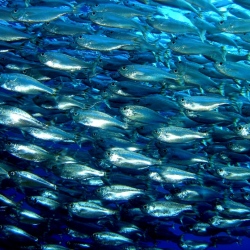
On June 1st, Fabien Cousteau, grandson of Jacques Cousteau, swam down to the last existing undersea habitat research lab in the world, Aquarius, in the Florida Keys. He’ll live there for 31 days, which is a day longer than the time his grandfather spent living in his undersea habitat, Conshelf II, roughly 50 years ago.
Since then, undersea bases have been created all over the world, and have since lost their funding and ceased operation. Aquarius stands as the last. The aquanauts joining Cousteau on "Mission 31" are photographers, scientists from Northeastern and MIT specializing in marine biology and underwater engineering, and Aquarius staff. They’ll all experience the unique challenge of living underwater for over a month in the pressurized saturated diving environment.
Saturated diving is a type of diving which allows the body to gradually soak up inert gases by staying at depth for a long period of time. These gases would harm a standard scuba diver by expanding like the bubbles in a shaken bottle of soda when the diver returns to the surface, causing pain, paralysis, and sometimes death.
With the team sleeping in the base, at depth, and never surfacing, the divers are free to experience the most useful part of living in Aquarius: the ability to dive for 2-8 hours a day (as opposed to about an hour maximum per day that a regular scuba diver can achieve) without suffering from decompression sickness. At the end of the mission, the entire base is slowly brought back to normal pressure so that the gases can escape the diver’s bodies safely, at which point the divers are free to resurface.
To find out what the human body and mind go through living in an underwater habitat, I spoke to various experts on living underwater, such as John Clark, Scientific Director for the U.S. Navy Experimental Diving Unit, who researches the effects of deep dives to 1,500 feet and Navy saturation diver Marc Chase who has worked on salvage jobs like the recovery of the USS Monitor’s wreck.
I also spoke to Mark Patterson and Brian Helmuth, Mission 31 science advisors who have spent working time in Aquarius, and Mark Hulsbeck, the oceanographic field operations manager who will have spent 200 days in the base overall by the end of this mission.
